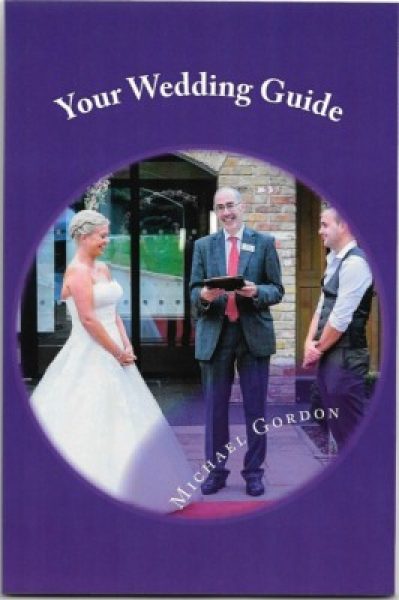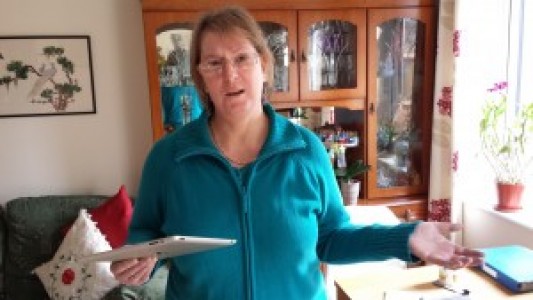
by Michael | Apr 29, 2015 | Blog
An insuperable obstacle?
Planning a wedding is a pretty daunting prospect. You may just be lucky, and have wise advisors and experienced, understanding support. The chances are, though, that it’s new to you, and you’re going to have to do the best you can. You’ll have to make – and learn from – your own mistakes. Some may be expensive.

An amazing solution
That sounds pretty grim. However, would you be prepared to spend about £5 to get a dependable, easy-to-follow guide?
If so, you have come to the right place!
As part of my role as civil celebrant, I frequently come across couples swimming in a sea of bewilderment and despair. There’s not a lot of help out there for them – although there is at least the option of an event planner. Naurally, these don’t come cheaply.
What if there was a guide that they could buy for ‘peanuts’, that would lead them gently and securely towards the Eldorado of a successful wedding? Towards a unique, memorable and meaningful day? That would offer them great ideas? Something that they could consult at every step of the way?
Well, look no further.
I am proud and excited to announce that I have put the proverbial pen to paper (except it’s all been done by computer, of course) and produced a handbook specifically aimed at helping couples get on their way with a minimum of fuss or difficulty. That’s not to say that there isn’t still hard work to be done, or time and money to expend. Of course, there is, but you can at least be sure that you are progressing, covering most eventualities and not going round in circles.
What areas are covered?
Some of the areas I look at include:
- choice of ceremony and celebrant
- the service: rituals, vows, music, etc.
- ‘team’ roles
- speeches
- guests
- children
- same-sex weddings
- hiring professionals
- social media
I don’t pretend to have something for absolutely everyone (budgets, as well as taste, will vary enormously), but I am convinced that there is so much in the wedding guide for everyone (from first-timers to wedding planners!).
I am delighted to be the one to fill what seems to be a huge gap in the market.
If you know somebody who might benefit from this handbook, please put them in touch with me. It’s easy to buy: just click here, and you’ll be through to Amazon.
I am not actually anticipating a million-seller block-buster, but I am really excited to be offering practical help to couples, so that they can have the wedding they are dreaming about!
by Michael | Apr 14, 2015 | Blog
Nowadays, same-sex weddings are legal in England & Wales and increasingly popular. Nonetheless, this is a field which may cause major opposition from the family. Let’s therefore take a serious look at this issue.
The guest list
All weddings face the inevitable question: whom do you invite? Selecting your guests is a tough one to answer at the best of times. You will probably start with close family and friends, but what if your closest relatives oppose your union?
Rejecting the rejectors
If it looks like relatives will boycott your wedding, do you go with the flow and simply not invite them? Isn’t it better all round to opt for your friends and (supportive) relations? After all, you’re likely to be spending a huge amount of money on the reception. Why should you have to accommodate people who won’t accept what you’re doing and, at worst, might even turn out to be trouble-makers?
No one would blame you for thinking twice before inviting people openly hostile to your union. On the bright side, they might decline and at least you’ll have gained kudos by having extended the olive branch!
An olive branch
Another advantage that might be gained from inviting disapproving relatives is that they might, albeit grudgingly, attend and – who knows? – eventually enjoy a tasteful and personalised ceremony. Wouldn’t that be something if you were able to ‘convert’ them and retain – even develop – a relationship with them?!
For many of us, there is the bond of love that unites us with our families. We may not always like our relations, but to upset and potentially do without them for the rest of our lives is something we would do only when all else has failed. Giving them a chance to stay connected with you (even loosely) is surely worth the effort.
If the worst comes to the worst, at least you’ll know you tried. And you could gain such a lot, if you can bring those relatives together with you.
Come what may, your wedding will be a commemoration of love, with promises for the future. It’s not the day to heal rifts, but it may be the pathway to do so, and that is something which should be embraced.
A few thoughts
Why should a gay wedding be drastically different to a traditional, heterosexual one? There’s no reason why women should not be in white, and carrying bouquets of lilies. Men can certainly be in suits. The wedding day is the most important day of their lives, and they are entitled to choose to mark it by looking their very best. The affair can be elegant and tasteful – and, in my view, should be.
Gay marriage is legal in most States of the US and is becoming commonplace in the UK too, so we all need to become more comfortable with the concept.
In a ‘traditional’ gay wedding, there are some questions to consider: should there be “bridesmaids” – or even whatever the masculine equivalent is? Or a combination of them? And what about surnames? Should either of the pair change their name after marriage? If so, which one? Presumably, that will be down to choice.
There may be some decisions for the officiant: instead of “you may kiss the bride”, the easiest thing would simply be “you may kiss”.
Of course, at present, there’s not really much of a precedent for gay marriages, so the traditions are up for grabs. But do we need to invent any, actually?
To find a civil celebrant for your personalised ceremony, look no further than https://vowsthatwow.co.uk/civil-weddings/


